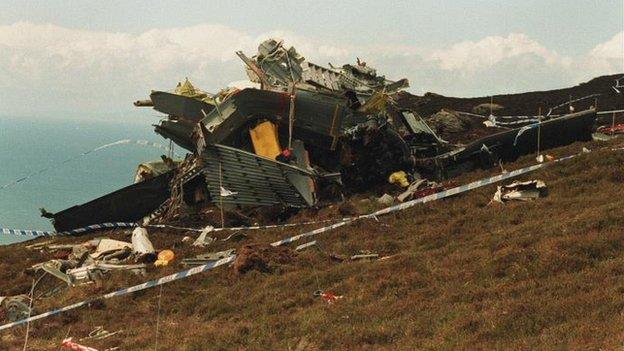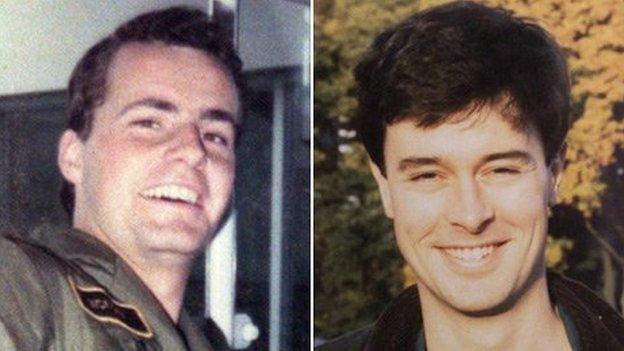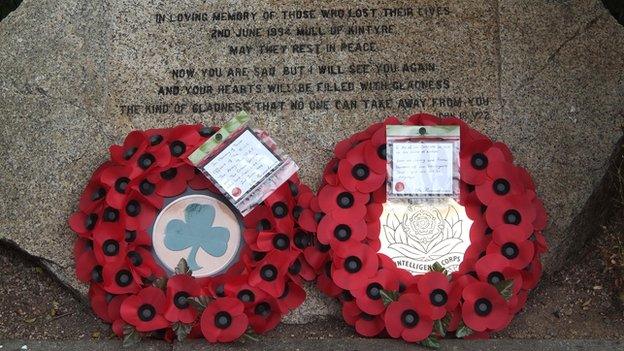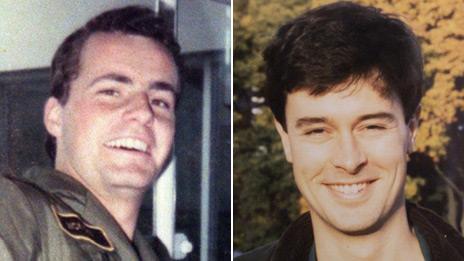Mull of Kintyre crash: Memorials mark 20th anniversary of RAF Chinook disaster
- Published

The RAF Chinook helicopter crashed on the Mull of Kintyre in June 1994, killing everyone on board
Memorial services have been held in Northern Ireland and Scotland to mark the 20th anniversary of an RAF air crash in which 29 people died.
A Chinook helicopter carrying 25 of the UK's most senior intelligence experts crashed on the Mull of Kintyre on the west coast of Scotland on 2 June 1994.
Leading security personnel from the Royal Ulster Constabulary (RUC), MI5 and the Army died, alongside the crew.
Some of their relatives have said the cause of the crash is still a mystery.
The passengers were travelling to a security conference at Inverness in Scotland from RAF Aldergrove in Northern Ireland when the aircraft ploughed into the hillside in thick mist.
The four crew members who died were from the Special Forces.

The pilots, Flt Lt Richard Cook, left, and Flt Lt Jonathan Tapper, were eventually exonerated of blame for the crash following a fresh review of the evidence in 2011
Reviewing the evidence of an initial 1995 RAF board of inquiry, two air marshals concluded that gross negligence on the part of the two pilots was to blame, but their families led a long campaign to clear their loved-ones' names.
Successive defence secretaries resisted pressure to reopen the case, but in May 2010, the then Defence Secretary Liam Fox announced he was ordering a review of the evidence.
The following year, pilots Flight Lieutenants Jonathan Tapper and Richard Cook were exonerated of any blame by the fresh review.
The original RAF verdict, which had already been criticised in separate House of Commons and House of Lords committee reports, was set aside.
Dr Fox also apologised to the families of both men who had been wrongly held responsible for the crash.
A stone memorial bearing the names of all those who died has been erected at the crash site
The Ministry of Defence (MoD) has insisted that mechanical failure was not to blame.
"Exhaustive investigations have been carried out, both by the MoD and independent bodies, and no evidence of technical or mechanical failure were identified, " a MoD spokesman told the BBC.
But Dr Susan Phoenix, who lost her RUC husband in the crash, remains unconvinced.
She criticised the MoD's handling of the case, adding she has spent 20 years not knowing what caused the crash.
"As far as I know, no official reason was given for the crash. The generic thing (reason) is that 'we may never know'.
"And it is true that we may never know. I think there will always be a mystery. It really is an enigma," Dr Phoenix said.

A memorial was held at the headquarters of the Army's 38 (Irish) Brigade in Lisburn on Monday
In 2001, the RUC became the Police Service of Northern Ireland (PSNI), as part of the Northern Ireland peace process.
Memorial services were held to mark the anniversary at PSNI headquarters in Belfast and on the Mull of Kintyre.
Another service was held at the headquarters of the Army's 38 (Irish) Brigade in Lisburn earlier on Monday.
At the Mull of Kintyre Memorial Garden in the city, representatives from several of the families took part in a private ceremony alongside senior representatives of the military and MoD.
The names of those who died were read out by Lt Colonel Nick Ilic and a wreath laid by Brigadier Ralph Woodisse, commander of 38 (Irish) Brigade.
- Published13 July 2011

- Published12 April 2011
- Published12 April 2011